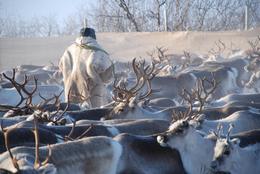Rapid change
 The Arctic is extremely vulnerable to actual and projected impacts due to climate change. The region is now experiencing some of the most rapid and severe climate changes on Earth.
The Arctic is extremely vulnerable to actual and projected impacts due to climate change. The region is now experiencing some of the most rapid and severe climate changes on Earth.
Impacts of climate change
Climate change is expected to accelerate over the next 100 years, contributing to major physical, ecological, social, and economic changes. In the Arctic, these changes are already producing major impacts. Over the past few decades, the annual average Arctic temperatures have increased almost twice as fast as those of the rest of the world, with Alaska warming about 6 to 8 times the global average. These changes, will affect the rest of the world through increased global warming and rising sea levels.
Documentation of climate change
The scientific evidence regarding these rapid changes, is documented in the 2004 Arctic Climatic Impact Assessment, the IPCC’s AR4 of 2007, and an increasing number of scientific papers across a wide range of disciplines. These changes range from increased melting rates across the Greenland ice sheet to projections of a seasonally ice-free Arctic Ocean. Drawing upon their traditional knowledge, for over 20 years indigenous peoples have reported environmental changes resulting from the shifting climate. Science and traditional knowledge in the Arctic are providing compatible and mutually reinforcing perspectives and conclusions.
Consequences of climate change
The Northwest Passage(USA and Canada) and the Northern Sea Route (Norway and Russia) may become increasingly important navigation routes. The projections of shipping routes in the Arctic suggest that the Northern Sea Route and the Northwest Passage may be ice-free for 4-6 months each year within decades. A recent scientific study released by NASA projects that the entire Arctic basin could be ice-free, for several weeks in the summer, by as early as 2013. Large-scale efforts to exploit newly-accessible energy resources in the Arctic are already underway. Russia is developing giant gas fields in the Barents Sea, for example, and a number of corporations are developing ice-strengthened vessels for use in Arctic waters. Offshore development is certain to have major onshore consequences arising from infrastructure development.
